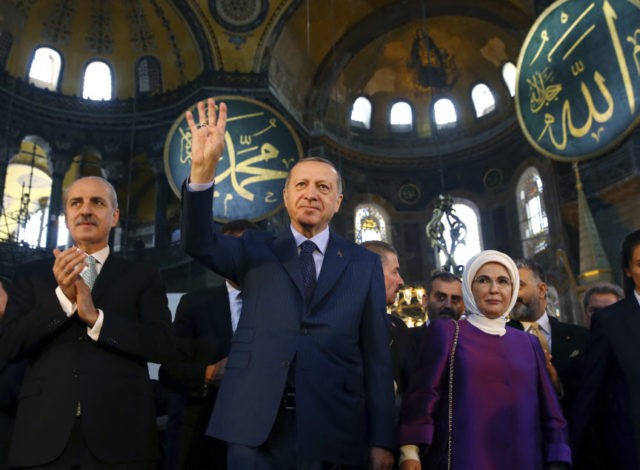Turkish President Recep Tayyip Erdoğan led an audience at what was billed as a classical Turkish art event in reciting a Quranic prayer at the Hagia Sophia on Saturday, dedicating it to “Istanbul’s conquerer,” Ottoman Sultan Mehmed the Conqueror.
Saturday marked the Christian holiday of Holy Saturday, when many Christians participate in Easter vigils in anticipation of the resurrection of Jesus Christ on Easter Sunday.
The Hagia Sophia is an ancient Greek Orthodox basilica, built in 537 AD in what was then the Christian city of Constantinople. It fell to Muslim invaders in 1453 and served as a mosque until the establishment of the secular Republic of Turkey in 1922 by founder Mustafa Kemal Atatürk. Atatürk banned the religious use of the building and turned it into a museum in 1935. In the past decade, Erdoğan has promoted the Islamic use of the basilica, including permitting a call to prayer there in 2016.
The prayer that Erdogan offered on Saturday was part of his remarks to open the Yeditepe Biennial, a festival to celebrate Turkish art which will run from March 31 to May 15. The event will feature thousands of Turkish artworks displayed in both indoor and outdoor venues, including the Hagia Sophia, according to the state-run Anadolu news agency.
Erdoğan reportedly said in his remarks that it was “difficult and emotional” to speak in the “magnificent and holy” Hagia Sophia. Islamic clerics recited some parts of the Quran before Erdoğan took the stage, but he followed that performance up with a request that those in attendance recite the first verse of the Quran along with him, dedicated to Mehmed the Conqueror.
The first verse of the Quran reads:
In the name of Allah, the Most Gracious, the Most Merciful: All Praise is due to Allah, Lord of the Universe The Most Gracious, the Most Merciful. Owner of the Day of Judgement. You alone do we worship, and You alone we turn to for help Guide us to the straight path; The path of those on whom You have bestowed your grace, not (the way) of those who have earned Your anger, nor of those who went astray.
No reports indicate that Erdoğan mentioned the occasion of Holy Week, the holiest Christian holiday, during his remarks in the former basilica that day, which remains technically a secular building.
Under Erdoğan, Turkey first allowed the recitation of Quranic verses in the Hagia Sophia in 2015, before allowing a call to prayer a year later on July 1, 14 days before Erdoğan would face a failed coup d’etat against his Islamist government and during the Muslim holy month of Ramadan. At the time, the government of Greece—whose ancestors built the basilica and who have not regained control of the UNESCO World Heritage site—loudly protested the religious use of the building. Islamic prayers in the basilica, Athens insisted, were “not compatible with modern, democratic, and secular societies.”
“Hagia Sophia is a UNESCO world heritage site. The attempt to convert it into a mosque—through reading of the Koran, holding of prayers, and a number of other actions—is an affront to the international community, which needs to be duly mobilized and to react,” the Greek Foreign Ministry insisted.
Erdoğan disregarded the protests and has continued to allow Islamic use of the Hagia Sophia. Islamist supporters of his regime have demanded the building be officially converted into a mosque.
In addition to being an affront to Turkey’s small minority of Christians and the history of Istanbul, reverting the Hagia Sophia back to religious use undermines the legacy of Atatürk, so revered in Turkey that it is illegal to commit any “affront to the memory of Atatürk.” Despite the existence of this law, Erdoğan himself has disregarded or openly opposed much of Atatürk’s legacy. Last month, Erdoğan accused Atatürk (without naming him) having “destroyed” the Turkish language by creating a universal, Latin-alphabet based Turkish language to ensure universal education and communication within the country. Erdoğan complained that the language was now full of “unpleasant, dull and soulless words” and would best be written in Arabic.
Last year, Erdoğan argued that Atatürk would have supported his unpopular move to switch the government from a parliamentary to a presidential system, greatly expanding his power. Atatürk greatly supported the switch from an imperial court to a parliamentary republic following the Armenian genocide, so as to grant the newly-homogenous Turkish people more autonomy.

COMMENTS
Please let us know if you're having issues with commenting.